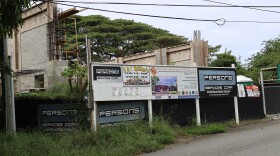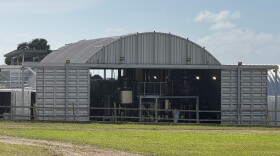ST. THOMAS — Senators questioned the territory’s true economic growth and pace of progress to complete disaster recovery projects while stressing a need for the legislative and executive branches to work together to address ongoing issues after hearing Governor Albert Bryan Jr.’s “upbeat” and “optimistic” State of the Territory Address.
The governor delivered his nearly two-hour speech to a packed audience in the Earle B. Ottley Legislative Hall Monday evening on St. Thomas, directly addressing senators and Delegate to Congress Stacey Plaskett, as well as members of his Cabinet and the public during his sixth State of the Territory Address. He committed to providing the best possible quality of life for Virgin Islanders, and to create abundant opportunities for Virgin Islands prosperity.

The governor discussed economic progress despite a temporary “cash crunch” as expenditures have outpaced revenue collections during the past six months, plans to introduce more renewable energy onto the grid at the Virgin Islands Water and Power Authority as well as residentially, and a new Rebuild USVI initiative being developed to expedite the timeline for the territory’s disaster recovery, which is expected to grow in value to at least $15 billion in federal assistance from an estimated $12 billion.
Economic progress:
The governor said the state of the territory is “resolute” as he noted a rebound from the social and economic impacts of the coronavirus while indicating his administration has not been deterred from continuing to deliver on its promise of progress for the people of the Virgin Islands.
“That progress is most evident in the strength of our economy,” he said, adding that the economy continues to demonstrate resilience through sustained economic and job growth despite facing inflation, rising interest rates and volatile global conditions.
Bryan noted the recession predicted by economists in 2023 never occurred, the national economy has remained steady, and the stock markets finished the year at or near an all-time high. Despite the expectation that higher interest rates and elevated inflation will weigh on economic activity soon, he said those factors have not altered the longer-term outlook for the economy.
“The Virgin Islands remains well-positioned to navigate these challenges and is expected to experience continued economic growth in the coming years,” Bryan said. “Our economy is, indeed, stronger now than it was before the pandemic. This is undeniable economic progress.”

Although the governor touted economic progress, some senators questioned the territory’s financial stability moving forward.
“We see different pictures, and if you’re telling me that we’re not doing our job, then I’ll accept that part because we’re having money sit on the table,” Senator Franklin Johnson, of the four-member Senate minority, said.
Johnson pointed out there are about $72 million in federal funds that have not been drawn down, so the territory continues utilizing local funds.
“You can’t have money sitting on the table and coming asking me for us to go and borrow; it doesn’t add up,” he said. “We have to be responsible and collect the monies that we have on the street. Right now, there’s some $89 million owed to vendors; that’s a problem. We’re going to cause business to close down, so where the uptick is, I definitely want to see it.”
Senator Samuel Carrión, a member of the Senate minority, said the governor seemed “optimistic and hopeful,” pointing out members of the governor’s financial team painted a different picture when they appeared before the Committee on Budget, Appropriations and Finance last Friday.
“There seems to be a disconnect because when we had his finance team before us, they were saying one thing and we heard him tonight saying something different, so clearly we have a financial management problem, and I don’t think personally that our economy is as strong as he’s trying to present it to be,” he said. “I do think that within the government we need to do some changes internally. I know he’s been asking for a line of credit, but I think that first we need to manage properly what we have.”
Senate Majority Leader Kenneth Gittens said the governor’s speech was “upbeat,” but questioned how long it would take to complete the projects and initiatives discussed. He noted the governor spoke about projects at WAPA in addition to roads, schools, and the hospitals, but pointed out there was no mention of timelines.
“That was a bit concerning for me because I think that this is just dragging on a bit too long,” he said.
Discussing the government’s financial stability, Gittens stressed a need for proper management of funds.
“We don’t have a money problem here in the territory, but rather a money-management problem, and until we could get our managers to actually manage and move these funds along and whatnot, I do believe that we’ll continue to see these delays, and I was just a bit hopeful that I will hear him be a bit more aggressive in getting some of these funds that he’s boasting about spent by showing a timeline,” he said.
Senator Donna Frett-Gregory, Committee on Budget, Appropriations and Finance chair, connected economic progress to the ongoing disaster recovery.

“Economic progress is tantamount on us being able to see our projects come to fruition,” she said, noting how recovery projects result in an increase in income, corporate and gross receipts taxes.
Frett-Gregory agreed that a projected increase in cruise ship arrivals to the territory would support economic growth, but questioned the administration’s plan to ensure enough workers are available to meet the demand.
“I really didn’t hear about our workforce development, and to me that’s a big piece of our economic development,” she said.
Frett-Gregory said she expected to hear the governor talk more about the ongoing efforts to rebuild hurricane-damaged schools in addition to school maintenance. She said she was encouraged that the governor is committed to standing up the Bureau of School Construction and Maintenance within the Virgin Islands Department of Education, noting she worked on the legislation for three years. She said the bureau will only be successful if the right people are put in place to run it, stressing the need for the Senate to fund it.
“I’m looking forward to seeing a lot of the things coming to fruition, but I’m a firm believer that in order for us to get those things done, we really have to work together,” she said. “Working in silos does not really help us to move the needle in the Virgin Islands. It’s time that we really recognize that we have to put our personalities, all the other things aside and really work toward getting things done in a very collective and collaborative way.”
At-Large Senator Angel Bolques Jr. pointed out how the economy spikes during tourism season.
“What I believe needs to happen is that we need to find other ways to diversify our economy and not just lean on the tourism market,” he said. “We really need to take a more serious look on our agriculture, what we can produce not just to sustain ourselves, but things that we can actually export as an island nation.”
Gordon Ackley, Republican Party in the Virgin Islands chairman, issued a statement in response to the governor’s speech that pointed out there is no balance of political party power in the Legislature of the Virgin Islands, which has an 11-member Democratic majority.
“What we have heard and continue to hear from Government House is no different than what the ruling party has said for years,” he stated. “Continuing with one party rule has not and will not fix the serious issues hurting families, our children and grandchildren, and job creators across all three islands. The ruling party and only the ruling party is to blame for unsafe water, unaffordable and unreliable electricity, bad roads, closed schools and libraries, and inflation that makes living in our islands increasingly unaffordable.”
Ackley defended his statement by pointing out that there hasn’t been a true balance of power in the Legislature since the 1980s when there were a handful of Republicans in office. He said he believes that the Democratic Party has owned everything since the ’80s.
“They don’t have a difference of opinion and voters don’t really have a choice,” he said by phone, noting the Independent Citizens Movement party has been “destroyed,” and the second largest party in the territory is no party.
Ackley is hopeful to be able to have two Republican candidates on the senatorial ballot in each district during the general election.
“Republicans will offer Virgin Islanders a real alternative with viable candidates for senator in each district this November,” he said in his statement.
Energy reform:
In addition to an investment of more than $100 million to subsidize the cost of energy to keep utility rates down and the use of four new Wärtsilä generators at the Randolph Harley Power Plant on St. Thomas to provide more efficient power, Bryan noted ongoing efforts to go green with the addition of solar and wind at WAPA.
The governor discussed five power purchase agreements with VI Electron to supply WAPA with 58 megawatts of solar power that will include Honeywell battery storage systems, noting solar farms will be located on St. Croix, St. Thomas, and St. John, and the first of two slated for The Big Island is expected to be operational by April. He further noted a PPA with Advance Power to provide wind energy on St. Thomas.
“The Bovoni Wind Project should provide more than 15 megawatts of wind power at about 11 cents per kilowatt hour compared to 43 cents we are paying now,” he said.
The governor said the truly exciting opportunities to transform the territory’s energy infrastructure go beyond WAPA, noting President Joe Biden’s Inflation Reduction Act allows the U.S. Environmental Protection Agency to fund Solar for All programs nationwide. He said the territory anticipates being awarded $100 million as part of the funding allocation to allow the Virgin Islands Energy Office to install solar photovoltaic systems directly on low-income, single-family homes at no cost to the homeowner, as well as to allow solar developers to install community solar that can provide electricity bill credits to low-income residents who are renters or whose roofs are not suitable for installing solar.
“The Virgin Islands Energy Office is currently awaiting approval of the grant award,” he said.
Senate President Novelle Francis Jr. spoke of an urgent need to reduce utility rates beyond subsidizing the authority to prevent the costs being passed on to ratepayers.
“While that’s commendable, there’s no real light at the end of the tunnel in regard to how we’re going to address this WAPA issue in a holistic manner,” he said.
Although the governor discussed efforts to develop solar opportunities for low-income, single-family homes, Francis stressed a need to immediately reduce the cost of energy.
“That’s not something that’s gonna be happening in the very near future,” he said about the residential solar projects. It’s a very complex, complicated issue that would definitely require some time, and we have our seniors and those people who can’t afford to make those payments, or those commitments to be able to install these PVs, as well as the battery, that will continue to rely on WAPA to be able provide them the power, so we have to find some means of driving that cost down so that we don’t continue to have our citizens deciding whether or not to buy medication, or buy food, or to pay WAPA. It’s unfair to them.”
To fix WAPA, Francis stressed the need for the administration to work with senators toward finding a solution. Although there are initiatives in place to aid homeowners in installing solar, he said there are still residents who rely on the grid.
“I believe those individuals that’s able to get off of the grid are those very same individuals that could have paid their WAPA bills,” he said. “The hardship of the senior citizens and others on fixed income that struggle to pay their bill will continue to exist, so I believe that there must be some concerted effort to really address that issue.”
Ackley, a retired entrepreneur who has owned multiple businesses, said the high utility rates are negatively affecting the territory’s economy.
“It is sucking the lifeblood out of businesses,” he said.
The territory’s GOP chair recalled experiencing the same issues WAPA ratepayers are facing now back when he was growing up on St. Thomas as a teenager.
“We had rotating power when I was a kid, and we still haven’t fixed it,” he said.
Ackley, while reiterating that having Republicans in the Senate would provide an alternative point of view, questioned the government’s rush to go green with solar, noting problems when it comes to using solar panels supported by batteries for storage capacity since neither last forever, and create an environmental obstacle for proper disposal.
“I have questions, and that’s why we have a two-party system,” he said.
Ackley advocated for green hydrogen, which he noted is among the cleanest burning fuels available.
“But unless you have another party, people do stupid things,” he said.
Senator Ray Fonseca spoke of the hardship caused by high utility rates.
“WAPA continues to just be a tremendous burden on the government of the Virgin Islands and the Virgin Islands Housing Authority,” he said. “Even with those four new Wärtsilä generators, they still can’t meet our demand, so there’s a lot of work that is left in the community to be able to be where we are at an acceptable level, but that’s the reason that we are here — to work hard to serve the people.”
The high cost of energy is one of the biggest challenges when it comes to economic development because it deters many companies from coming to the territory, Senator Marvin Blyden said. He said it will make a big difference once the utility rates are under control, adding that he thinks the territory is headed in the right direction.
“It’s a problem and we are getting there, and I look forward to continuing supporting and working with all my colleagues and the authority in terms of accountability, transparency and making sure that we can assist them in bringing down the cost of energy here in the territory,” he said.
Disaster recovery:
Bryan said Rebuild USVI supercharges the territory’s disaster recovery to think outside the box and dispense with the bureaucracy that is simply inadequate for the territory’s progress. He said the initiative’s success will allow for several of the largest recovery projects to simultaneously launch, creating an ecosystem of economic activity from the resulting construction boom that is expected to double the approximately $500 million that has been spent annually throughout the past six years and speed up the slow recovery pace so that it doesn’t take 20 years.
“As a core strategy, Rebuild USVI will group many of the top priority recovery projects into billion-dollar bundles for procurement,” the governor said, adding that the initiative’s three major goals are to attract some of the nation’s largest general contractors who can secure the necessary performance bonds on projects worth hundreds of millions of dollars, systematically resolve logistical challenges and supply chain issues, and solidify workforce and capacity issues.
Blyden, who noted that he would have loved to have heard the governor give more details about pending capital projects, said he’s curious about how the Rebuild USVI initiative would work. He warned that bringing in large contractors could result in construction jobs being taken away from residents.
“Our people are left out, and that is my concern — how it would look when it comes to bundling,” he said. “We have to be able to eat. We must be part of the recovery, so I would like to see exactly how that looks like, how it would work and what benefits are included for our contractors, our local small contractors, and the like.”
Frett-Gregory acknowledged that there is a shortage of construction workers in the territory, stressing that parameters must be included for the large contractors when it comes to hiring Virgin Islanders who are qualified to do the work.
“I do suspect once those contractors come into the Virgin Islands, the contract has to require that they hire locals,” she said.
Senate Minority Leader Dwayne DeGraff said it’s one thing to talk about bringing in help to rebuild the territory, but questioned what the administration is doing to take care of senior citizens.
“That’s one thing that have me on edge to know that we have an aging population and there was no mention about people who have put in their time and years and effort here to build this territory to what it is, and no mention of it,” he said, noting he has legislation pending to use funds the territory received from the Jeffrey Epstein settlement to construct $10 million senior facilities in each island district.
Fonseca said there is a need to increase the speed of the recovery effort.
“While I can see some progress is being made, I think the pace of the progress is not acceptable,” he said. “I think we need to pick up the pace, specifically when he talked about $12 billion overall in federal assistance.”
Fonseca said the obligations to fund the projects so far have been minimal, noting they are less than 25% of the total recovery cost.
“I want to support the initiatives, but I don’t think the pace is an acceptable level,” he said.















